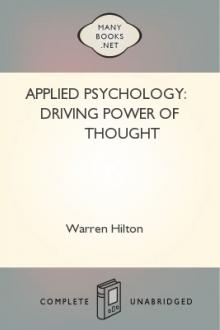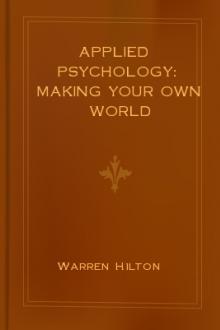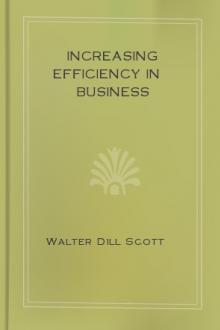Applied Psychology: Driving Power of Thought - Warren Hilton (top non fiction books of all time txt) 📗

- Author: Warren Hilton
- Performer: -
Book online «Applied Psychology: Driving Power of Thought - Warren Hilton (top non fiction books of all time txt) 📗». Author Warren Hilton
The Project Gutenberg EBook of Applied Psychology: Driving Power of Thought, by
Warren Hilton
This eBook is for the use of anyone anywhere at no cost and with
almost no restrictions whatsoever. You may copy it, give it away or
re-use it under the terms of the Project Gutenberg License included
with this eBook or online at www.gutenberg.org
Title: Applied Psychology: Driving Power of Thought
Being the Third in a Series of Twelve Volumes on the
Applications of Psychology to the Problems of Personal and
Business Efficiency
Author: Warren Hilton
Release Date: July 4, 2010 [EBook #33076]
Language: English
*** START OF THIS PROJECT GUTENBERG EBOOK APPLIED PSYCHOLOGY, VOL 3 ***
Produced by Bryan Ness and the Online Distributed
Proofreading Team at http://www.pgdp.net (This book was
produced from scanned images of public domain material
from the Google Print project.)
Applied Psychology
DRIVING
POWER OF THOUGHT
WARREN HILTON, A.B., L.L.B.
FOUNDER OF THE SOCIETY OF APPLIED PSYCHOLOGY ISSUED UNDER THE AUSPICES OF
THE LITERARY DIGEST
FOR
The Society of Applied Psychology
NEW YORK AND LONDON
1920
BY THE APPLIED PSYCHOLOGY PRESS
SAN FRANCISCO
(Printed in the United States of America) CONTENTS
One of the greatest discoveries of modern times is the impellent energy of thought.
That every idea in consciousness is energizing and carries with it an impulse to some kind of muscular activity is a comparatively new but well-settled principle of psychology. That this principle could be made to serve practical ends seems never to have occurred to anyone until within the last few years.
Certain eminent pioneers in therapeutic psychology, such men as Prince, Gerrish, Sidis, Janet, Binet and other physician-scientists, have lately made practical use of the vitalizing influence of certain classes of ideas in the healing of disease.
We shall go farther than these men have gone and show you that the impellent energy of ideas is the means to all practical achievement and to all practical success.
Preceding books in this Course have taught that—
I. All human achievement comes about through some form of bodily activity.
II. All bodily activity is caused, controlled and directed by the mind.
III. The mind is the instrument you must employ for the accomplishment of any purpose.
You have learned that the fundamental processes of the mind are the Sense-Perceptive Process and the Judicial Process.
So far you have considered only the former—that is to say, sense-impressions and our perception of them. You have learned through an analysis of this process that the environment that prescribes your conduct and defines your career is wholly mental, the product of your own selective attention, and that it is capable of such deliberate molding and adjustment by you as will best promote your interests.
But the mere perception of sense-impressions, though a fundamental part of our mental life, is by no means the whole of it. The mind is also able to look at these perceptions, to assign them a meaning and to reflect upon them. These operations constitute what are called the Judicial Processes of the Mind.
The Judicial Processes of the Mind are of two kinds, so that, in the last analysis, there are, in addition to sense-perceptions, two, and only two, types of thought.
One of these types of thought is called a Causal Judgment and the other a Classifying Judgment.
A Causal Judgment interprets and explains sense-perceptions. For instance, the tiny baby's first vague notion that something, no knowing what, must have caused the impressions of warmth and whiteness and roundness and smoothness that accompany the arrival of its milk-bottle—this is a causal judgment.
The very first conclusion that you form concerning any sensation that reaches you is that something produced it, though you may not be very clear as to just what that something is. The conclusions of the infant mind, for example, along this line must be decidedly vague and indefinite, probably going no further than to determine that the cause is either inside or outside of the body. Even then its judgment may be far from sure.
Yet, baby or grown-up, young or old, the first effort of every human mind upon the receipt and perception of a sensation is to find out what produced it. The conclusion as to what did produce any particular sensation is plainly enough a judgment, and since it is a judgment determining the cause of the sensation, it may well be termed a causal judgment.
Causal judgments, taken by themselves, are necessarily very indefinite. They do not go much beyond deciding that each individual sensation has a cause, and is not the result of chance on the one hand nor of spontaneous brain excitement on the other. Taken by themselves, causal judgments are disconnected and all but meaningless.
I look out of my window at the red-roofed stone schoolhouse across the way, and, so far as the eye-picture alone is concerned, all that I get is an impression of a flat, irregularly shaped figure, part white and part red. The image has but two dimensions, length and breadth, being totally lacking in depth or perspective. It is a flat, distorted, irregular outline of two of the four sides of the building. It is not at all like the big solid masonry structure in which a thousand children are at work. My causal judgments trace this eye-picture to its source, but they do not add the details of distance, perspective, form and size, that distinguish the reality from an architect's front elevation. These causal judgments of visual perceptions must be associated and compared with others before a real "idea" of the schoolhouse can come to me.
Taken by themselves, then, causal judgments fall far short of giving us that truthful account of the outside world which we feel that our senses can be depended on to convey.
If there were no mental processes other than sense-perceptions and causal judgments, every man's mind would be the useless repository of a vast collection of facts, each literally true, but all without arrangement, association or utility. Our notion of what the outside world is like would be very different from what it is. We would have no concrete "ideas" or conceptions, such as "house," "book," "table," and so on. Instead, all our "thinking" would be merely an unassorted jumble of simple, disconnected sense-perceptions.
What, then, is the process that unifies these isolated sense-perceptions and gives us our knowledge of things as concrete wholes?





Comments (0)